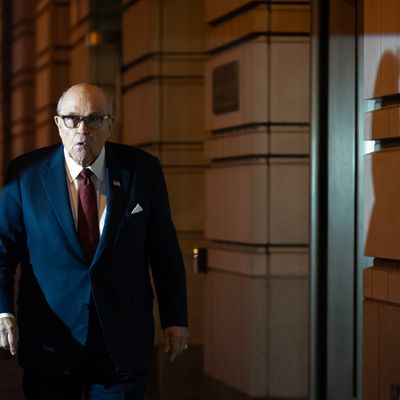
Rudy Giuliani’s defamation case is about a lie that is believed by around half the country, and the first two days of his civil trial this week have reflected that split-screen reality. Inside the sealed environment of the Washington, D.C., courtroom, defendant Giuliani has watched two days of testimony about the myriad ways in which his efforts to overturn the result of the 2020 election upended the lives of a pair of innocent Georgia election workers. This Giuliani has looked like a tired and diminished man. Outside the room, though, he is still Rudy, still throwing haymakers and spouting calumnies, unconstrained by a court’s rules of evidence and decorum, not to mention his self-interest as he faces a jury that will assess the financial damages he caused by falsely accusing two anonymous Black women on a surveillance video of stealing the election in Georgia from his client at the time, Donald Trump, and sending his supporters on a mission to find them.
“It was a pretty boring day,” Giuliani told me late Tuesday afternoon as he left the courtroom. This was a false statement: Much of the testimony had been riveting. Shaye Moss, a former employee of the Fulton County elections department, took the stand and described the repercussions that she and her mother, Ruby Freeman, co-plaintiff, had felt after being labeled as perpetrators of the “the crime of the century.” Moss testified she had lost her career, her sense of safety, and her mental health. What’s more, Trump, Giuliani, and their allies had kept on lying. “They’ve been debunked,” she said, “but they’re powerful people.”
As he got to the courthouse elevators, headed down, Giuliani muttered: “Poor little Ruby. Up against Rudy, with all those lawyers.”
In the courtroom, Freeman and her daughter are represented by a large team of attorneys, including Michael Gottlieb, a former associate counsel in the Obama White House and now a litigator at the big law firm of Willkie Farr & Gallagher. Their lawsuit has been a project of a nonprofit called Protect Democracy, whose counsel, John Langford, handled much of Moss’s testimony. Giuliani, by contrast, sits with just one frustrated-looking lawyer, Joseph Sibley.
Whether the appearance of an overwhelming mismatch is designed to evoke the jury’s sympathy or just reflects Giuliani’s reduced circumstances — Sibley has repeatedly implied that the former mayor, who used to be paid six figures for speeches and long ran a buck-raking international consulting firm, is close to broke — is hard to guess. Giuliani declined to turn his current financial records over to the plaintiffs in the course of discovery, along with numerous other documents, texts, and emails. In August, Judge Beryl Howll came to the conclusion that Giuliani was stonewalling in an attempt to minimize his “overall litigation risks,” which include other civil lawsuits, a criminal indictment in Georgia, and potential federal charges related to the violence of January 6. (He is mentioned as an unnamed co-conspirator in Trump’s indictment.) She entered a default judgment against Giuliani, finding that he committed defamation against Freeman and Moss. With the facts no longer disputable, Sibley has been sharply constrained in what he is allowed to argue before the eight-person jury, which will be solely tasked with assessing financial damages.
“Mr. Sibley has a hard job,” Howell said Tuesday, outside of the jury’s presence, as the lawyers argued over how much room Giuliani would have on the stand to claim he still thought the election was stolen, or to shift the blame for the harms to the plaintiffs to other parties, or internet culture in general. However, the judge sternly reminded the attorney that Giuliani had passed up his opportunity to mount that defense by refusing to give the plaintiffs documentary evidence that might allow a glimpse into his state of mind at the time.
“We’re in the situation we’re in,” Howell said, “because of your client.”
Outside her courtroom, Giuliani has approached the defamation lawsuit in the same way that Trump has gone after his civil and criminal cases: always defy, always attack. What plays to the mob, however, likely won’t help Giuliani with a jury that has the power to make him pay for his behavior. (The plaintiffs plan to ask for as much as $43 million in compensatory damages, and the jury can assess a theoretically unlimited amount of punitive damages.) “It’s purely delusional magical thinking,” says Dan Novack, a media lawyer who hosts the podcast Slandertown. “There could not have been a thought process. No one’s tried this before for a reason.”
Giuliani has continued to claim the election in Georgia was stolen, and to a lesser extent to malign Freeman and Moss, right through the trial, creating a sort of defamation feedback loop. After Sibley tried to strike a note of contrition before the jury in his opening statement, saying that Freeman and Moss were good, hardworking people and admitting there was “no question they were harmed,” Giuliani went outside and told the news cameras he had no regrets about what he had said, saying he planned to testify that he “told the truth.” Within hours, the plaintiffs had filed a motion with the judge seeking to limit Giuliani’s ability to repeat his defamation on the stand. In the arguments over the motion, Howell expressed some incredulity to Gottlieb, asking why he wanted to confiscate Giuliani’s shovel when he was so clearly intent on digging, making more statements that “can be brought in to help bolster additional punitive damages.”
Nonetheless, Howell granted the motion. “This is a witness box for answering questions,” she told Sibley. “This is not a platform for pontificating or spreading lies.”
Like any jury, this one is not supposed to pay attention to news coverage, but Giuliani’s statements outside the courthouse can still make their way into the case.
“Has Mr. Giuliani ever apologized to you?” Langford asked Moss during his examination. She replied “no.” “Is Mr. Giuliani still spreading lies about you?”
“He was just spreading lies about me last night,” Moss replied. She testified that when she returned to her hotel after the trial’s first day, she had seen Giuliani on TV.
“I thought, what in the world?” Moss said. “That’s what he said. That’s how he feels.”
A previous witness, from a firm that tracks online abuse, had testified that on at least 20 occasions since last July, Giuliani has repeated some element of his claim that on Election Night, Moss and Freeman had used their positions inside the absentee-ballot-counting operation in Atlanta’s State Farm Arena to illegally inflate Joe Biden’s vote total. Giuliani’s “estimates” of the number of fraudulent votes have varied wildly, but he has claimed that the number involved exceeds Biden’s 12,000-vote margin in Georgia, meaning that many Trump followers ended up being told that these two Black women were responsible for stealing the whole state. The consequences for the women — a deluge of harassment and racist threats — was tragically predictable. Moss sobbed as she described how she feared she would be murdered.
“My client, as you saw last night, likes to talk a lot, unfortunately,” Sibley said as he gingerly began his cross-examination. His latitude to question Moss was tightly constrained by the judge’s previous ruling that the defamation was not in dispute. He asked about another lawsuit she and her mother are pursuing, against the website Gateway Pundit, seeming to suggest that Giuliani was not solely to blame. He inquired about her finances. (Moss left her job with the Elections Department and said she was not seeking new employment as she worked with a therapist to regain her emotional footing.) Given the opportunity to face Giuliani, Moss flashed some defiance of her own, rejecting any suggestion that her lawsuit was financially motivated.
“I want to vindicate myself. I want to receive some justice for everything me and my family have been through,” Moss said. “Maybe the truth needs to be screamed just as many times and just as loud as the lies.”
Giuliani was unmoved. “I’m going to do my show tonight,” he said as he got out of the elevator, referring to his video podcast, America’s Mayor Live. “Eight o’clock, on Twitter. YouTube too.”
Out on the sidewalk, a clutch of reporters was waiting to record his latest outrage. “Who’s paying for this?” yelled his spokesman, Ted Goodman. “You guys see it!”
“The reality is, I’ve never seen that many lawyers in a case,” said Giuliani. Then, like a hallucinating chatbot, he returned to his favorite subject, Hunter Biden. “Gottlieb represented the crooked company Burisma,” Giuliani said, referring to the plaintiff’s lawyer. “He was close to Hunter. Somebody is paying millions for this. As we now know from one of the ladies, they have no money. So I know what lawyers charge. Somebody should be interested in, is this a political hit job?” (Gottlieb, who declined comment, was previously at the large law firm Boies Schiller Flexner with Biden, and though they did work on one case together, there is no evidence in the record to suggest he ever represented the Ukrainian energy company Burisma.)
Giulani’s sidewalk defense was interrupted by a young woman who got in the background of the camera shot, holding a sign reading “RICO RUDY … RACIST PIG.”
“We’re going to cut this short,” said Goodman, pulling Giuliani toward the street. The agitator, who said her name was Brianne Chapman, posts on Twitch and YouTube as Anarchy Princess. She was recording the scene to use as content. She kept berating Giuliani as he waited for his car.
“Fuck you, Rudy Giuliani, you’re going to die in prison!”
“Say that first part a little louder,” Giuliani said, looking amused. “You got a really nice mouth.”
“Fucking traitor!” Anarchy Princess shouted. “Benedict Arnold!”
“This is an example of an illness,” Giuliani said, addressing the reporters as if he were the voice of reason. “A mental illness called Trump Derangement Syndrome. Unfortunately, people in power have this sickness. She doesn’t matter.”
I asked Giuliani if he still planned to testify in his defense. He deflected the question, blaming the judge. “I got her annoyed. So I’ll wait until it’s over and then I’ll have a lot to say.” An SUV with an American flag decal on the window pulled up, and he went off to tape his show.































